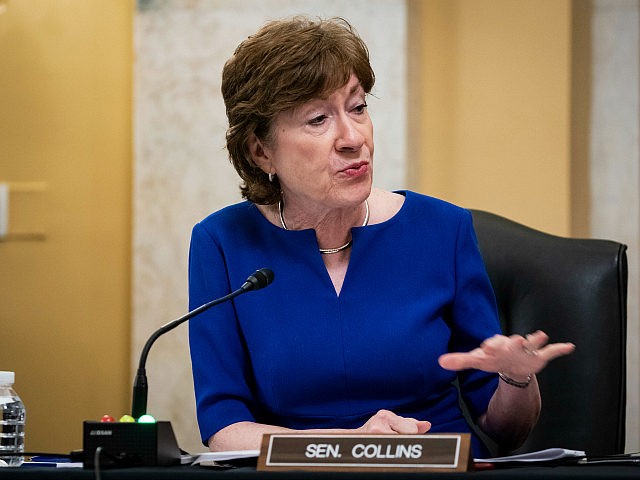Sen. Susan Collins (R-ME) said this week that she would “oppose” President Donald Trump’s Supreme Court nominee if the vote occurred prior to November 3, because “we’re simply too close to the election.”
While the Maine lawmaker said she has “no objection” to the Senate considering a Supreme Court nominee prior to the presidential election, she clarified on Tuesday that she will oppose the nominee, should the vote take place prior to November 3.
Calling her original statement a “model of clarity,” Collins said, “I made it very clear, yes, that I did not think there should be a vote prior to the election.”
Collins stated that she would “oppose the nominee” if the Senate proceeds with a vote “not because I might not support that nominee under normal circumstances, but we’re simply too close to the election.”
“And in the interest of being fair to the American people — and consistent since it was with the Garland nomination that the decision was made not to proceed, a decision that I disagreed with, but my position did not prevail — I now think we need to play by the same set of rules,” she added.
Sen. Lisa Murkowski (R-AK) also indicated that she would not support a vote, stating that lawmakers should apply the same standard used in 2016:
My statement after hearing of the passing of Justice of United States Supreme Court Justice Ruth Bader Ginsburg: pic.twitter.com/1zhWSH5hhg
— Sen. Lisa Murkowski (@lisamurkowski) September 19, 2020
Even with their opposition, it appears Senate Majority Leader Mitch McConnell (R-KY), at this point in time, has enough GOP support to push the forthcoming nominee through. On Monday, Sen. Cory Garnder (R-CO) announced that he would vote to confirm the nominee, should he or she “protect our Constitution, not legislate from the bench, and uphold the law”:
Read my full statement on the Supreme Court vacancy ⬇️ pic.twitter.com/n2YNP8O0Bz
— Cory Gardner (@SenCoryGardner) September 21, 2020
On Tuesday, Sen. Mitt Romney (R-UT) followed suit, noting the “historical precedent of election year nominations is that the Senate generally does not confirm an opposing party’s nominee but does confirm a nominee of its own.”
“I intend to follow the Constitution and precedent in considering the president’s nominee. If the nominee reaches the Senate floor, I intend to vote based upon their qualifications,” the Utah senator announced:
My statement regarding the current Supreme Court vacancy: pic.twitter.com/6YO0dPWWXc
— Senator Mitt Romney (@SenatorRomney) September 22, 2020
During a Senate floor speech on Monday, McConnell debunked the narrative that it would be nearly impossible for the Senate to consider and vote upon Trump’s nominee — who he is expected to announce his choice on Saturday — before the election.
“We’re already hearing incorrect claims that there is not sufficient time to examine and confirm a nominee. We can debunk this myth in about 30 seconds,” he began:
United States Senate“As of today, there are 43 days until November 3 and 104 days until the end of this Congress. The late, iconic Justice John Paul Stevens was confirmed by the Senate 19 days after this body formally received his nomination — 19 days from start to finish,” the Kentucky lawmaker explained:
Justice Sandra Day O’Connor, another iconic jurist, was confirmed 33 days after her nomination. For the late-Justice Ginsburg herself, it was just 42 days. Justice Stevens’ entire confirmation process could have been played out twice, twice, between now and November 3 with time to spare. And Justice Ginsburg herself could have been confirmed twice between now and the end of the year with time to spare.
“The Senate has more than sufficient time to process a nomination,” he added. “History and precedent make that perfectly clear.”

COMMENTS
Please let us know if you're having issues with commenting.